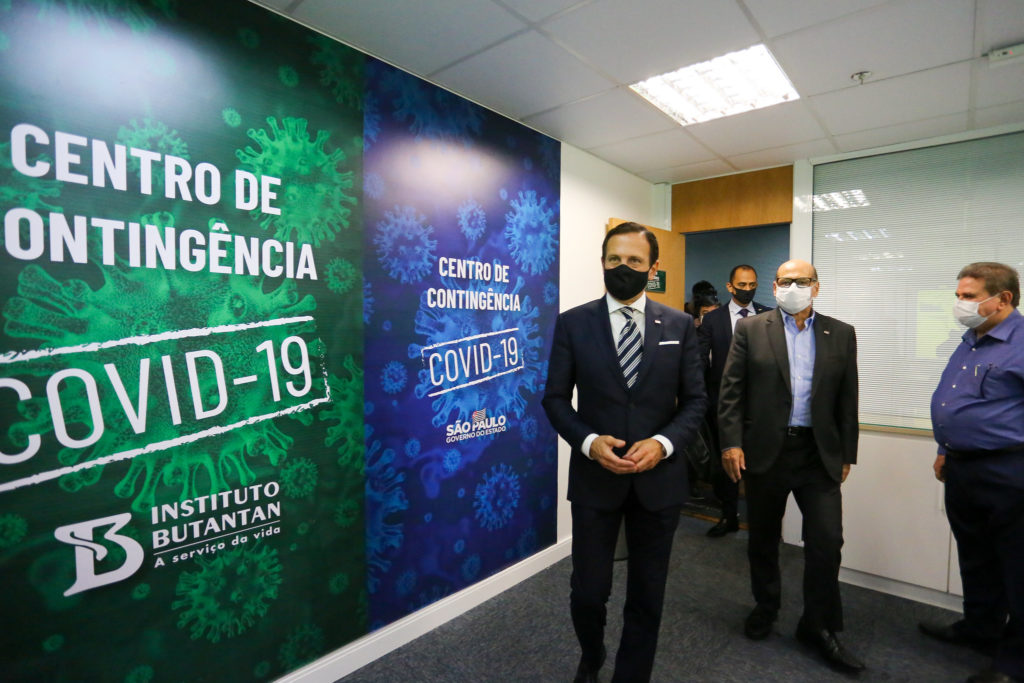SÃO PAULO, BRAZIL – São Paulo State Governor João Doria announced on Thursday, June 11th, an agreement between the Butantan Institute and a Chinese laboratory for the final testing stage of a vaccine against the coronavirus. According to him, the vaccine is expected to be available in June next year, provided the results are satisfactory. It would then be distributed throughout the country in the National Health System (SUS).

The agreement, signed Wednesday afternoon with Sinovac Biotech laboratory, allows for technology transfer for large-scale production of the vaccine in the country, according to the governor. In other words, the Butantan Institute, linked to the Government of São Paulo, in addition to conducting clinical studies, will be able to produce vaccines directly in Brazil, without having to import them.
In exchange, the Institute will be in charge of large-scale testing on human volunteers. According to the governor, these will start in three weeks and will have the involvement of 9,000 people throughout Brazil. “It is one of the most advanced vaccines under development in the world,” says Dimas Covas, director of Butantan. In addition, there are another 100 studies being conducted worldwide in search of an antidote against Covid-19, ten of them in more mature stages.
Other than this one, from Sinovac Biotech in partnership with Butantan, known as Coronavac, there is a project at Oxford University with which the federal government announced a partnership last week, also for the last stage of testing 2,000 volunteers in the country – the final results of this study are scheduled for August 2021.
Brazil has become one of the epicenters of the disease in the world and, due to its widespread virus circulation, has become a good environment for mass testing. In these tests, volunteers are infected with the coronavirus to promote the production of antibodies against the disease. Therefore, it is important that these people move around in a highly exposed environment so that determining whether they are indeed protected is possible.
The test vaccine does not contain the entire live virus, only fragments of it. It will feature the same development technology that Butantan currently uses for the dengue vaccine, which will greatly facilitate production. However, initially immunization will come from China, which is already in the production stage of the antidote, even before the end of testing. In a second stage, it will be developed and widely distributed by Butantan.
This is the third clinical stage of the study, which has already undergone two earlier tests in China. The first stage involved 144 Chinese volunteers and the second 600, who are still being followed up in the Asian country. “You don’t go into stage three of testing if you lack the evidence that it works. So far, the vaccine has proved very effective. What we have to look at now is the degree of protection,” explains Covas. “It takes an average of ten years to achieve a vaccine.
The pandemic has shown the need for speed. “In the case of H1N1, we also thought that it would take ten years, but it proved over 80 percent effective in record time. We are running out of time,” said Sergio Cimerman, an infectologist invited by Doria to the press conference. The H1N1 outbreak, which caused panic in the world in 2009, was contained with a vaccine discovered that same year from adjustments to existing flu vaccines.
Openness in isolation
The partnership announcement takes place on the day that the São Paulo capital, the most affected by the virus in the country, will reopen its shopping malls. On Wednesday, when street trade was reopened with restrictions, the city’s isolation rate stood at 48 percent, according to the state government. The first day of trade reopening was marked by an intense flow and lines of customers outside shop doors.
On Thursday, São Paulo reached the figure of 162,520 cases of Covid-19 and 10,145 deaths. There was an increase of 3.8 percent in 24 hours in the number of infections and 2.8 percent in the number of deaths, an average similar to the last few days, according to the Government of São Paulo.
The ICU occupancy rate in the state stands at 69.4 percent and at 77 percent in Greater São Paulo. There are also 5,211 people with suspected or confirmed disease hospitalized in the Intensive Care Units of the State, in addition to another 8,085 in wards.
Source: El País

